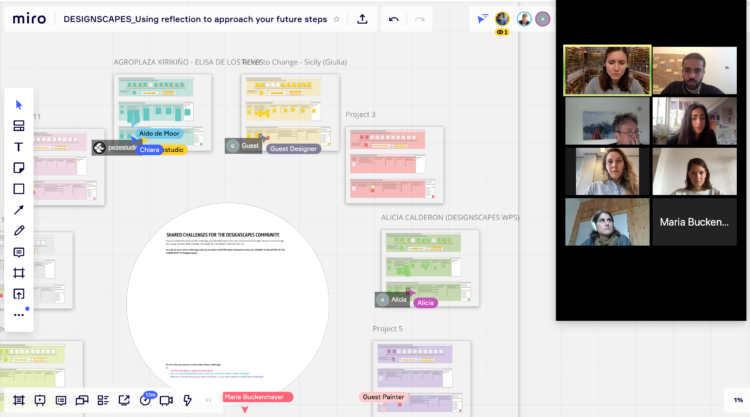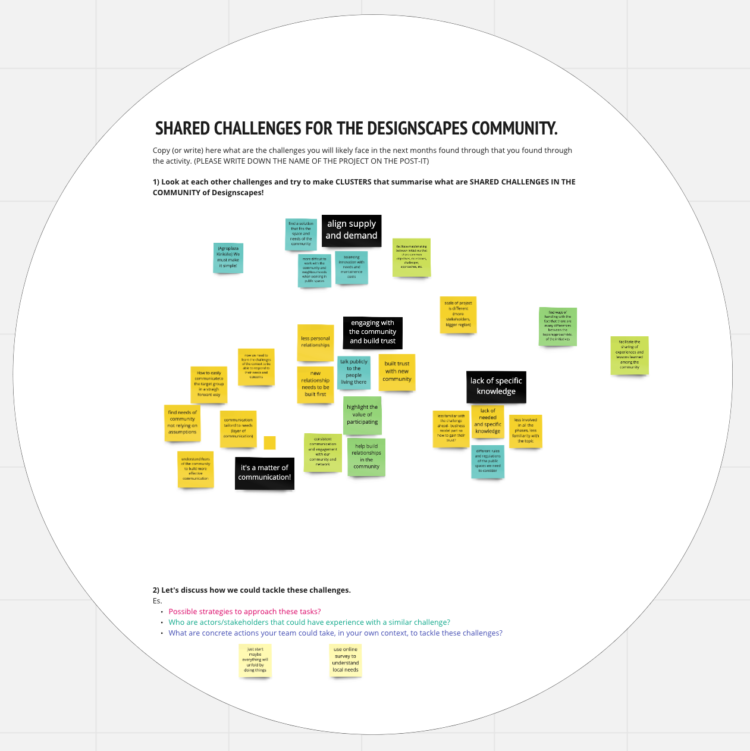Introducing reflection as a tool for building capacity
On Tuesday 6th October the TUDelft Team kicked the DESIGNSCAPES Capacity Building program off with a module dedicated to the 3rd stage of the project’s Open Calls, Scalability.
The selected initiatives for funding in this call took part as participants in an online workshop. The first module for the scaling stage, titled “Use reflection to approach your future steps”, aimed at proposing reflection as a tool for urban innovators, and was based on the reflective activity developed by Alberto Magni as an outcome of his graduation project for the MSc in Design for Interaction, ‘Supporting urban innovators in framing their capacity-building journey’, and carried out in collaboration with the PCM Lab.
Set up by Alberto in close collaboration with Alicia Calderon Gonzalez, researcher of the lab for DESIGNSCAPES, the workshop proposed as well for Chiara Marradi and Maria Buckenmayer a valuable research opportunity for their respective graduation projects. A valuable chance to get to know more in-depth some specific aspects concerning the scaling strategies of the initiatives funded in the 3rd Open Call of DESIGNSCAPES.
Helping innovators reflect on their next steps
Chiara and Maria co-facilitated together with Alberto, a group session that helped the attendees/participants explore the tasks and challenges ahead in their next project phases. The session started by looking ahead and pinning down the main milestones entailed in the scaling phase of each of the initiative’s projects, namely Ticket to Change – Sicily and Agroplaza Kirikiño.
Each innovator then picked the most challenging ones to explore them more in-depth through a series of reflective questions. What emerged from the first reflections were some tasks and abilities crucial for the success of each of these milestones, few of them really specific to a project, some others, we realised, more shared among the group. The initiative representatives then looked back at their previous experiences in which they achieved similar tasks. Thinking of what they’ve been capable of in the past, helped them find what’s new and different in their current scaling phase, as compared to the previous experiences. In this way, newer, more specific requirements emerged as crucial for initiatives.

A fruitful activity for all...
The reflective activity introduced a new tool to the innovators for refining and exploring the nuances of the milestones ahead of them, and better structure what, oftentimes, is a fuzzy idea of future “jobs-to-be-done”; or as Giulia, one of the participants, put it to summarise the activity: “It felt like going to therapy! Now I have it all more clear.’
In times where context research is done behind a screen rather than ‘in the field’ with face-to-face interactions, this reflective workshop provided as well Chiara and Maria with a great opportunity to get first-hand insights into the obstacles the initiatives are facing and their needs for the upcoming months, to understand where they come from (past challenges) and where they are directed toward (future challenges and goals).
They learned that when it comes to scaling innovative solutions what is really needed is:
Engaging the new community
One of the most crucial steps is successfully engaging the community in the new context you’re innovating in and succeed in building real trust relationships. You must really connect with the newer context and target group! As Giulia (PUSH.) mentioned, knowing closely the community you design for/with makes a difference “We knew really well their needs and we gained the trust of the community. It then set the base for any other activities after that.”
How to establish similar trust relationships with a larger and more diverse audience? In fact, “It is more difficult to engage with institutions and local authorities. They are less responsive to certain innovative ideas…” said Elisa (PezEstudio).
Finding the right communication
Communicating properly your idea to a new network of users and stakeholders is fundamental if you want them to embark in the innovative project you are proposing them. So then, how can you engage a new network of stakeholders, considering as well the necessity of communicating mostly online due to Covid-19 restrictions? Once again Giulia mentioned, “When you pitch in person you can express the ‘fun’ aspects of a creative project” and this helps to connect with stakeholders at an emotional level, but how to deal with the more ‘professional’ tone of online communication?
Identify the new knowledge required
Immediately get to know what is the knowledge your team is missing to approach this step. Some of these lacking highlighted by initiatives were for example regarding ensuring the financial viability of the project in the new context and in the long term. Giulia (PUSH) admitted for example “The financial aspects of the actions (in the long term) are the wild card of our project so far”
Another one that emerged concerned identifying new regulations and norms present in a new urban context, that may affect your project. Elisa (PezEstudio) noticed for example that “the rules of the public space are going to be stronger, maybe we have to make a specific project, to talk to the city hall and all that…”.
When scaling your project is important to:
- Engaging the community in the new context you are innovating in and succeeding in building real trust relationships.
- Getting to know immediately what is the knowledge your team is missing to approach this step.
- Fine tuning your communication to convince your stakeholders to join in your project

Looking back, we were happy to say that the workshop confirmed how valuable collaborative activities between the lab students and researchers can be to all those involved. It was a mutual learning experience that contributed at once to the research work on Designscapes on ‘how design can support social innovations in their journey to scale’ and to the graduation projects of Chiara and Maria, to not mention the insights on their own projects gained by the initiatives themselves. Following this collaborative spirit, we hope this co-created workshop is just the first of many more collaborative activities to come, combining the research and education at the lab!